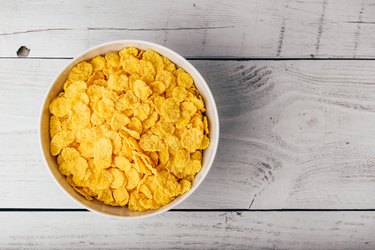
Your friend has found a new and not-so-bad way of losing weight by following a corn flake diet. That's right — as in Kellogg's Corn Flakes. Intriguing, right? If replacing all your meals with a simple bowl of cereal can help you lose weight, you might just be willing to try it.
Before you grab your spoon, however, you should stop to consider the long-term effectiveness of such a diet and what it might mean for your overall health.
Video of the Day
Video of the Day
Cereal for Weight Loss
You're probably wondering whether you can lose weight by eating nothing but cereal. Well, sure.
Studies, such as a small, older one published in December 2002 in the Journal of the American College of Nutrition, have shown that people who use cereal as a meal replacement (substituting one serving of ready-to-eat cereal, two-thirds of a cup of skim milk and a 100-calorie portion of fruit in place of lunch or dinner) not only lose weight but also continue to lose weight when they transition to a high-fiber, high-volume diet.
The study involved only a small pool of test subjects: four groups with between 26 and 28 members in each. More research needs to be done to further understand this diet's efficiency.
A Look at Nutrition
It makes sense why filling up on Kellogg's Corn Flakes could reduce weight. A 1-cup serving has only 100 calories, no fat and only 3 grams of sugar.
It's not necessarily the best cereal on the market though. Corn flakes dietary fiber (1 gram per serving) is less than that of oatmeal, which has 2 grams per half-cup, per the nutritional facts put out by the U.S. Department of Agriculture. This is likely one of the reasons oatmeal has been shown to provide a greater sense of satiety than corn flakes.
One benefit to corn flakes among other fortified breakfast cereals is that they have added vitamins and minerals, including iron, vitamin C, vitamin B6, vitamin B2, vitamin B1, vitamin A, folic acid, vitamin D and vitamin B12. Oatmeal has no added vitamins and minerals.
Read more: Top 10 Healthiest Cereals
It’s Still a Fad Diet
Just because a corn flakes diet for weight loss might work doesn't mean it's the best idea. According to Dr. Summer Allen with Mayo Clinic, any severe calorie restriction will lead to weight loss, but it's not sustainable for a long period of time.
Instead of following a fad diet, people aiming to lose weight should fill up on fruits, vegetables, whole grains and lean proteins. Physical activity is also an important part of weight loss.
What Are Better Options?
You can work corn flakes into a diet chart and enjoy it at any time of day, but it should not be the only food you consume, not even at breakfast.
Instead, the American Academy of Family Physicians recommends that dieters start their day with options such as a whole-grain English muffins with nut butter and fruit, old-fashioned oats with fruit and nuts, or eggs and toast topped with avocado. These breakfasts serve as well-rounded meals that not only supply fiber but also healthy fats.
Turning to a bowl of cereal like corn flakes for an easy snack can keep you full on very few calories, but if you want to maintain weight loss for a long period of time, it's best to adapt to a lifestyle with a balanced diet.
- Journal of the American College of Nutrition: "Ready-to-Eat Cereal Used as a Meal Replacement Promotes Weight Loss in Humans"
- Kellog's Corn Flakes: "Nutrition Facts"
- United States Department of Agriculture: "Household USDA Food Facts Sheet: Oats"
- Mayo Clinic: "Problem with Fad Diets"
- American Academy of Family Physicians: "Nutrition Made Simple"